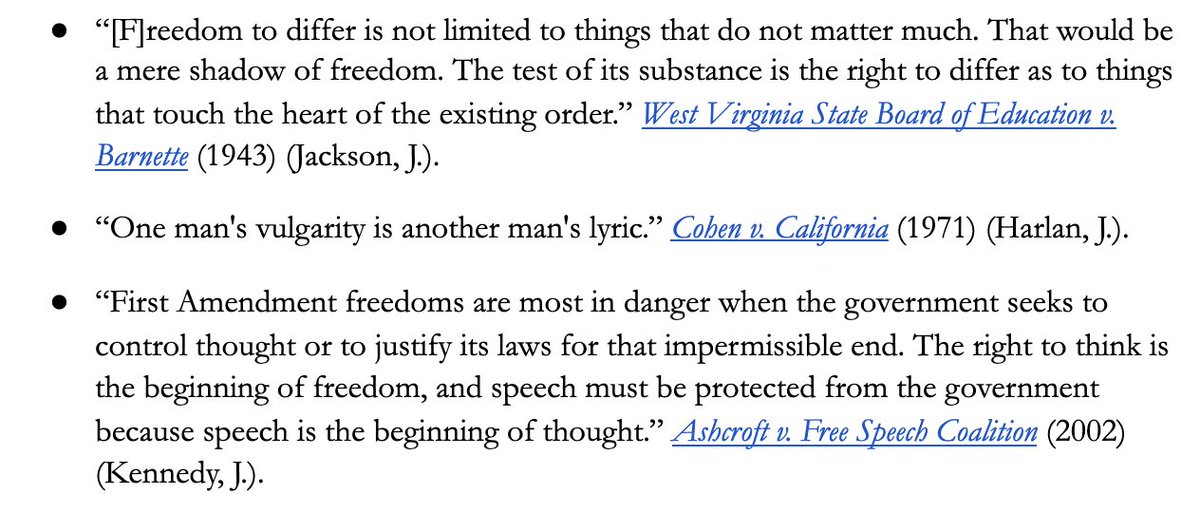
NEW: Catching Up With Coddling Pt 17. Hearing disturbing reports of K-12 programming with no respect for the individuality of students or the diverse points of view of students, I created a beta version of 10 principles for a healthier K-12 system. 1/12
thefire.org/the-empowering…
thefire.org/the-empowering…
1. No compelled speech, thought, or belief. It is usually bad to tell someone what they cannot say. It is usually far worse to tell someone what they must say, & it is always wrong to tell people what they must think or believe. 2/12
2. Respect for individuality, dissent, and the sanctity of conscience. American First Amendment law is replete with powerful statements about individual uniqueness, and respect for such uniqueness. 3/12 

3. Teachers & administrators must demonstrate epistemic humility. Our collective knowledge is incomplete, no ideology has a monopoly on truth, & to tell young people otherwise leaves them ill-equipped to live in a society where new discoveries are always to be made. 4/12
4. Foster the broadest possible curiosity, critical thinking skills, & discomfort with certainty. If we want to educate citizens to navigate this limitless ocean of information, we should cultivate a thirst for knowledge & the awareness that one should never be too certain. 5/12
ZERO TWEET: Keep reading to finish learning about my principles for a better K-12, or click the link below to read about the possible re-emergence of the worst thought-reform program FIRE ever saw. 0/12
https://twitter.com/glukianoff/status/1384991797609435139
5. Foster independence, not moral dependency. It is hard to overstate the dangers of training a generation of people in a democratic society to always look to authority figures to resolve life’s difficulties. 6/12
6. Do not teach children cognitive distortions. We seem to be teaching students the mental habits of anxious and depressed people.
You can see a full list of cognitive distortions in Appendix 1 for Coddling, newly available at the link below! 7/12
thecoddling.com/how-to-do-cbt
You can see a full list of cognitive distortions in Appendix 1 for Coddling, newly available at the link below! 7/12
thecoddling.com/how-to-do-cbt
7. Do not teach the Three Great Untruths.
The Untruth of Fragility: What doesn’t kill you makes you weaker.
The Untruth of Emotional Reasoning: Always trust your feelings.
The Untruth of Us Versus Them: Life is a battle between good and evil people. 8/12
The Untruth of Fragility: What doesn’t kill you makes you weaker.
The Untruth of Emotional Reasoning: Always trust your feelings.
The Untruth of Us Versus Them: Life is a battle between good and evil people. 8/12
8. Take student mental health more seriously. Anxiety, depression, self-harm, & suicide are all up. At the same time, we’re telling students that seeing certain words & arguments cause grievous psychic harm & that a single bad tweet could ruin their life. Not good. 9/12
9. Resist the temptation to reduce complex students to limiting labels. Sorting students into politically useful categories that involve assigning them character attributes or destinies based on immutable traits circumscribes their potential and hampers their growth. 10/12
10. If it’s broke, fix it. Be willing to form new institutions that empower students & educate them with principles of free, diverse, & pluralistic society. We must not become so wedded to an ideology or structure that we become impervious to criticism. 11/12
As I said at the beginning, these principles are a beta version! If you have positive or negative comments and feedback, please read the whole article, and then email contact@thecoddling.com. 12/12
BONUS: Read my last monthly Prestigious Awards in preparation for my first annual Extra Prestigious Book of the Year award later this week! 13/12
thefire.org/twitter-as-med…
thefire.org/twitter-as-med…
• • •
Missing some Tweet in this thread? You can try to
force a refresh



